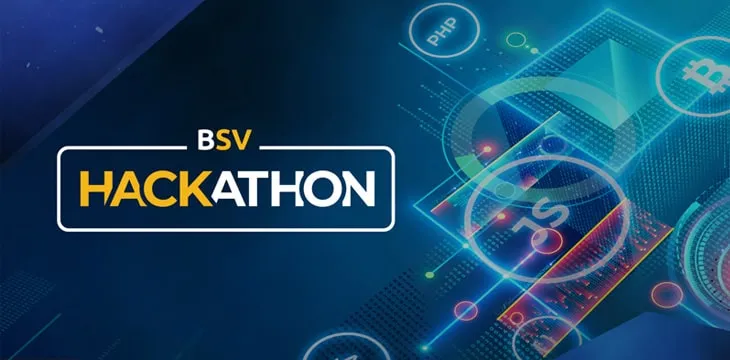|
Getting your Trinity Audio player ready...
|
The 3rd Bitcoin SV Hackathon moved into its preliminary judging phase following the conclusion of the coding round on August 18. Given the strong and diverse set of projects submitted, the preliminary judging panel has decided to announce today a list of semi-finalists – the top 10 entries from the projects submitted.
From this shortlist of semi-finalists, three finalists for the 3rd Bitcoin SV Hackathon will be selected and announced on September 2.
The three finalists will be invited to present their projects at the upcoming CoinGeek Live 2020 conference, September 30 – October 2. The Hackathon Final Round presentations will be on Day 1 (September 30) of the conference, with winners announced on Day 3 (October 2).The finalists will compete for a share of a USD $100,000 BSV prize pool – $50,000 for 1st place, $30,000 for 2nd, and $20,000 for 3rd.
Final placings will be determined by a combination of a Final Round judging panel and audience voting through an augmented reality experience for online attendees of CoinGeek Live.
To watch the Final Round presentations and have your say in who goes home with first prize and $50,000 in BSV, register for your free ticket to attend CoinGeek Live at coingeekconference.com.
Bitcoin SV Hackathons are organized by Bitcoin Association (the global industry organization that supports Bitcoin SV), run by nChain, and sponsored by CoinGeek. This third iteration has been the most popular to date, making competition for the shortlist fierce. In all, 418 people from 75 countries took part over the eight-week coding phase, with 42 final projects entered for consideration.
Entrants were asked to develop an application that advanced the competition theme ‘Connecting the world to one global blockchain’ and leveraged the unique capabilities of the Bitcoin SV blockchain. The entrants’ projects demonstrated significant diversity of business and consumer use cases for micropayment, data, and public ledger capabilities of Bitcoin SV.
The ten semi-finalist projects for the 3rd Bitcoin SV Hackathon are:
Aetherna
Aetherna is a place where audio content creators are able to upload, showcase, and monetize their audio files. Listeners are able to discover content and reward creators directly on an attention-paid-basis and optionally tip them if they really like it. The combination of time and money gives a better value of how quality content is measured instead of traditional likes and stream quantities. Users do not pay a monthly subscription, but instead, pay based on usage of the platform. Creators pay a one-off price for uploading their content.
Greenlight
A ‘Tokenized-in-a-box’ solution to allow businesses to more easily deploy Tokenized smart contracts and shareholder agreements. The greenlight app orchestrates the existing Tokenized services into a usable REST API and provides sample python scripts that demonstrate creating a smart contract for common shares, in addition to performing standard smart contract actions such as transferring shares.
Kyrt
Kyrt integrates Bitcoin microtransactions with subscribable events available via Zapier – a major platform enabling easy integration workflows across more than 2000 applications. Zapier is an incredibly powerful tool and by integrating a micropayment rail into any application interaction, the possibilities are endless.
MoneyStream
A micropayment streaming plugin that crosses the boundary from a single site platform, facilitating incremental payments for streaming content of any type and on any site – connecting content across the internet with a common valuation mechanism.
MyPaymailSend
MyPaymailSend offers a unique solution to the onboarding problem by enabling funds to be sent to an email address that does not currently have an associated wallet. Through a clever workflow, the recipient is incentivized to create a wallet because they know there are already funds waiting there for them to access. In combination with a compelling value proposition from a micropayment service, this could be a powerful incentive to onboard users to BSV
Parking SV
Parking SV is a single, universal system for global car parking. It solves the problem of current parking payment systems consuming a lot of time, as well as the inconvenience of needing to use multiple vendors – even within the same town or city.
Profitsilo
Profitsilo is an API for collecting, storing, and selling data in exchange for BSV micropayments, with a focus on automated machine-to-machine interactions. The system stores data as named, ordered lists of signed messages which require payment to access. It provides asynchronous notifications for other systems, publishing data and documents tailored to the recipients, committing to a hash
RepZip
Identity on-chain is a fiercely discussed topic in Bitcoin SV and a key missing piece of infrastructure. RepZip not only provides a real solution to the problem, but also integrates with Paymail and existing Bitcoin data infrastructure in a way that can satisfy a plethora of use cases. Identity is powerful and is a core link between the digital and the physical world. When the solution integrates 3rd party attestation, this will become a core and central part of day to day Bitcoin interactions.
STOTASK
STOTASK is a new entrant in the ‘gig economy’ that allows owners of datasets to leverage the idle time of anyone to apply human interpretation to tag data. This is a missing link between human classification and machine learning. Classification tasks that are easy for humans but hard for machines can become machine-learned with an initial human input. Bitcoin SV is used as the payment rail for STOTASK, enabling work to be paid out in very small increments. Coupling this with Metanet data structuring in the future has huge potential.
TacTic
TacTic is non-intrusive software, which once purchased and integrated, runs under the hood to certify accounting records on the blockchain. It interfaces with industry-standard accounting software packages (Quickbooks at present), to listen for events on WebHooks and transparently write accounting data to the blockchain, reflecting signed accounting entries on-chain for improved auditing.

 09-17-2025
09-17-2025 





